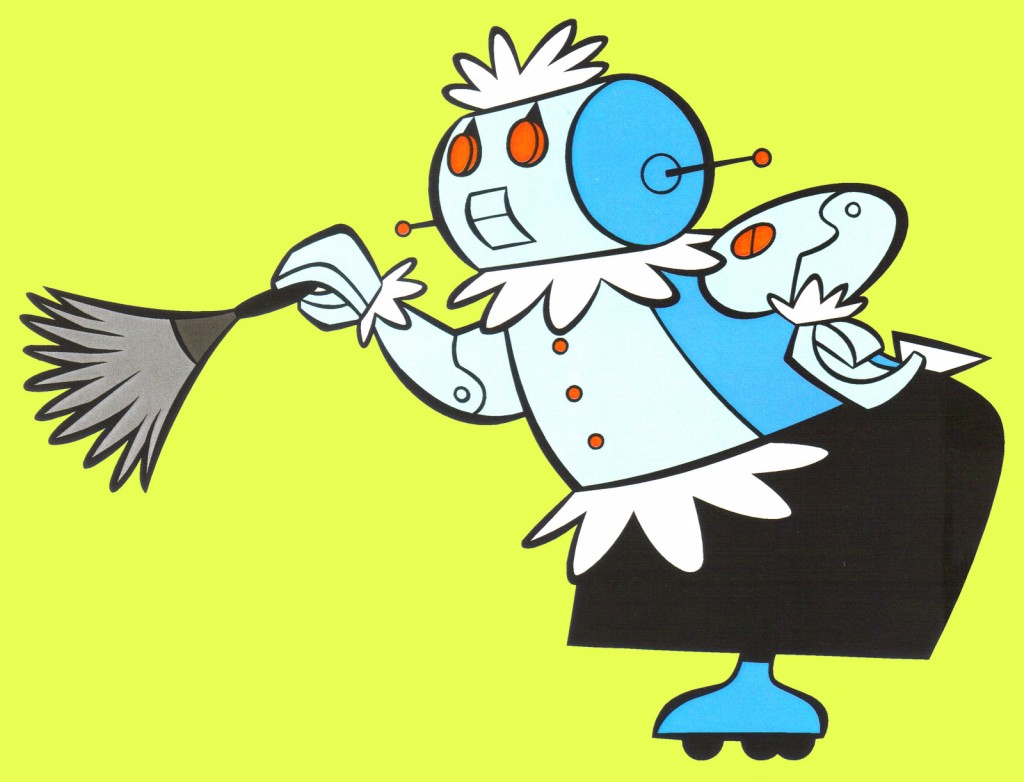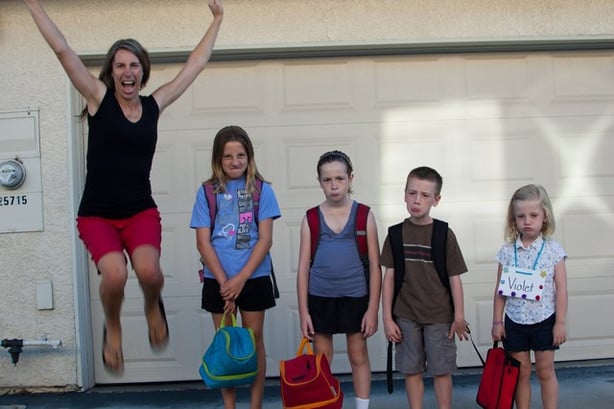New Advent had a link to an article on BBC about how extreme isolation warps our minds, and it got me thinking about life as a stay-at-home mom.
I’ve never met a SAHM who hasn’t recounted how at some point in her life as a mother, she would watch the clock in the afternoon, counting down the seconds until her husband would come home, and become irrationally angry if he were even a few minutes late. I’ve done myself; I still do it, often. It’s an eternal struggle within myself to allow my husband to come home and just relax. He’s an introvert, and talking is not relaxing for him. He just wants to take his shoes off and sit quietly for a few minutes, but in the meantime, I’m sometimes frantic for adult conversation. I’m an extrovert, and I spend my days mentally bookmarking all the things that I want to tell him about and fearing that if we don’t talk as soon as he gets home, it will get lost in the bustle of dinnertime and bedtime.
It’s odd, you know, because I’m talking with my kids all day, talking at them mostly, but also answering questions, reading stories, explaining the finer points of kitchen science (yes, I only understand science in relation to food). But it’s not the same thing as conversation with an adult. It’s not even the same thing as having another adult in the house.
Biologists believe that human emotions evolved because they aided co-operation among our early ancestors who benefited from living in groups. Their primary function is social. With no one to mediate our feelings of fear, anger, anxiety and sadness and help us determine their appropriateness, before long they deliver us a distorted sense of self, a perceptual fracturing or a profound irrationality. It seems that left too much to ourselves, the very system that regulates our social living can overwhelm us.
I choked on my tea when I read that. I understand having a distorted sense of self in a very real way. I have consistently relied upon others — my parents in childhood, my friends in college, my husband now — to mediate my feelings and help me determine their appropriateness. I’ve long been under the impression that this is a flaw in my character, that rational, mature, wholly-integrated people can mediate their own emotions and respond appropriately because they’re wizards, or something. The idea that my need to talk things over, get a second opinion, and sometimes have some sense smacked into me is not actually a fundamental flaw in my emotional development but the proper functioning of biology, is totally revolutionary.
At the same time, I can’t really consider myself isolated since I’ve literally been surrounded by small people for the better part of a decade, right? More so than ever before, I am never alone. I don’t eat alone, sleep alone, I hardly even manage to use the bathroom alone! But if the primary function of human emotion is social, can I really be said to be socially interacting with small children who have no knowledge of social interaction? It’s not like my 5-year-old can recognize when my emotional response to her endless flopping about like a dying fish instead of picking up that one shoe is out of proportion, and even if she could, it’s neither her responsibility nor her right, really, to inform me that my reaction is inappropriate. That’s what I should be teaching them, not the other way around. The problem is, it’s almost impossible to get a handle on my emotional state when I am surrounded by tiny irrational tyrants who have zero handle on their own emotional states. It’s sometimes inevitable that instead of being a cool voice of reason and order, I just throw in the towel and join the fray, because I can yell the loudest and I control the distribution of dessert, suckas!
I am aware that when other adult people are at our house, I temper my responses much more automatically than I do when it’s just me and the kids. I wonder if there isn’t a kind of isolation to raising many small children….nothing so extreme as hallucinations, but maybe over time the cognitive dissonance of feeling lonely while never being alone wears us down.
Loneliness also interferes with a whole range of everyday functioning, such as sleep patterns, attention and logical and verbal reasoning. The mechanisms behind these effects are still unclear, though what is known is that social isolation unleashes an extreme immune response – a cascade of stress hormones and inflammation.
For SAHM’s, all those “everday functions” are already interrupted. Logical and verbal reasoning? Good luck even finishing a sentence before the baby sticks a fork in the toaster, much less actually giving the 8-year-old a coherent explanation of the action of yeast and sugar in warm water. Attention? There are usually four people talking all at the same time, and my biggest concern at any given moment is attempting to give them all a fair hearing while also not forgetting how many cups of flour I’ve put in the mixing bowl. Sleep? HA!
How much more, then, do the subtle effects of loneliness wear on us? I can attest to feeling an almost constant barrage of stress hormones on a daily basis. Some of that’s just my anxiety and general high-strung nature…but not all of it. Some of it is genuine, overwhelming chaos, but there’s also a part of it that’s…loneliness. I can understand the reports about prisoners at supermax prisons starting fights with guards just to “reaffirm their own existence-to remember who they are.” I’ve started fights with the Ogre, or people online, motivated by just that same kind of restless, desperate feeling of meaningless unreality– does anyone see me? Am I even here? If I were replaced by Rosie Jetson, would anyone notice?

In Vegas, I started blogging because I felt like I was really going to go crazy if I didn’t find some kind of social interaction. And it did help. It helped immensely. It still helps, but what I’ve found is that more and more, I eschew real, face-to-face interaction with other moms in favor of the virtual kind.
Yeah, I have social anxiety, so that’s part of it. But I genuinely enjoy hanging out with 3-dimensional people. I feel much calmer and happier when I have a conversation with another mom, even if it’s interrupted 27 times by a couple of toddlers, than I do when I just spend the day blogging and cleaning and cooking. Even knowing that, I still find myself shying away from playdates or coffee dates.
Some of that is anxiety, some is just laziness, but I think some of it a kind of fear. It costs something to have a conversation with someone else, face-to-face. I know that it’s going to require something of me, something that writing a blog post does not require, and I wonder if the cost isn’t exactly what this article is talking about — how other people help us mediate our emotions.
No one really has to let someone else mediate their emotions on the internet. It’s one of the reasons echo chambers flourish in cyberspace. For every person who would provide a voice of temperance, there are five more ready to jump into battle with you and flay that guy alive (virtually, of course). What’s more, it’s far easier to create your own reality about yourself online than it is in real life, where that reality is forced to correspond to actual reality. Over coffee, you can spot if your friend is enlisting you for reassurance when what they need is honesty — on the internet, all you have to go on is the way your friend presents him or herself. It’s a constructed reality, and I doubt that the internet can wholly assuage genuine, long-term loneliness.
Loneliness that arises from isolation is a need to be seen, warts and all…even when I trick myself into thinking that I’m justified in what I’m ranting about, because look at all these people who agree with me, I still can’t trick myself into believing that these people actually know me and agree with me. They can’t really know me, because even though I’m notoriously honest, there’s still plenty that I hold back. Who doesn’t? After all, I know my best friend will love me no matter what I tell her, but I don’t have that same level of trust with most of the people I know online. And maybe I am too attached to the “me” I’ve created online…maybe the thought of shattering that facade is too painful. I try to do it, every once in a while, as a sort of exercise in mental health, but often the pushback is too painful, the questions too penetrating, and the vulnerability too overwhelming. I can look into the eyes of my friends and know that they will not turn around and point out all my flaws in public just for funsies; there’s no such comfort to be found in an avatar.
I don’t have a pithy conclusion to this post or anything. Actually I’d kind of rather I hadn’t started writing it, since the end result of this is probably going to be me forcing myself yet again to be more social, and I don’t wanna do that, cause it’s hard and people are scary and I’m awkward. But I spent all this time writing it and everything, so, you know. Here goes nothing.











